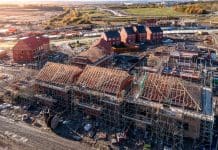The Royal Institute of Chartered Surveyors has released their UK Residential Survey for November, investigating the demand for homes and its effects on the market
The survey found that buyer demand for houses is increasing for the fourth consecutive month, driving UK house prices up.
Meanwhile, it was also found that the demand for rental tenancies is slowing for the first time since 2020.
UK house prices expected to continue growing in spite of higher mortgage interest rates
The national house price indicator, in terms of net balance, posted +25% in November, up from +16% in October, as the fourth consecutive monthly increase since summer.
Respondents to the RICS residential survey also indicated that they expect these prices to continue rising over the next 3-12 months.
New buyer enquiries also maintained a positive growth, with a net balance of +12%, keeping pace with the previous month and showing a continued recovery for buyer demand.
Trends in supply saw a rise in new instructions for +17%, the fifth month of growth in a row. Still, market appraisals stayed the same as they were a year ago, meaning the pipeline may slow into the new year.
Rental demand fell, but not expected to last long
On the flip side, agreed sales volumes stayed the same with a net balance of +1% compared to the +8% in the previous month. 19% of respondents feel there is an increase of sales activity coming in the next three months.
Tenant demand declined in November with a net balance of -1%, the first decline since 2020. This could be a reflection of seasonal factors, due to the November lettings dataset not being seasonally adjusted.
Landlord instructions also fell at -13%, as the sector continues to see an imbalance of supply and demand, but rental prices are predicted to grow again with +29% of respondents expecting as much in the near future.
RICS head of market analytics, Tarrant Parsons, said: “Although the latest survey results continue to signal a steady improvement in buyer demand across the residential market, the broader macro environment is likely to pose additional headwinds moving forward. Most significantly, the recent rise in mortgage interest rates may curtail the recovery in market activity before long, and this is reflected in the slightly less optimistic sales expectations data coming through this month.
“Moreover, measures of consumer and business confidence across the economy have deteriorated of late and, if sustained, this could begin to feed through into housing market conditions in the months ahead”.
The trends shown in the RICS residential survey are a promising continuation of what was found earlier this year, with Halifax showing in January that the average UK house prices had grown for the third month in a row. The typical home was valued at £287,105, with Northern Ireland in particular seeing a growth while South East England lagged behind.
The growth is good news for the housing market and with new updates and reforms to the NPPF, it is expected that profitability in housing construction is set to rise in the coming years.














